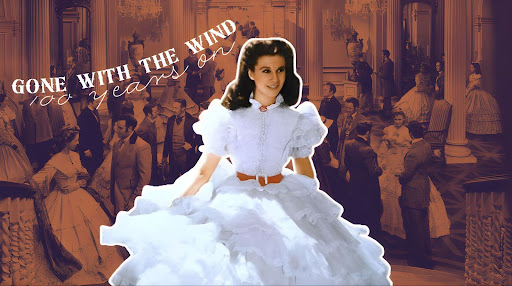Gone With The Wind, one hundred years on.
Gone With the Wind, a novel written by American author Margaret Mitchell in 1936 but best known for its screen adaptation with Vivien Leigh and Clark Gable in 1939, is perhaps one of the most popular stories of the time, creating a story-line that explores the transformation of a strong-willed character in the face of war and reconstruction.
In a modern age, however, it is controversial as it not only delves into whitewashed depictions of historical events but similarly minimizes the role of slavery in the Civil War.
The novel is a sprawling epic set against the backdrop of the American Civil War, and its subsequent aftermath. The story primarily follows Miss Scarlett O’Hara, a spoiled daughter of a Georgia plantation owner, who goes from living in an entire lavish, and dream-like world, to facing poverty and using any means necessary to support herself as the result of Sherman’s, ‘March to the Sea’. Despite these challenges, Scarlett’s indomitable spirit drives her to persevere, even as she grapples with her own desires and moral complexities.
Here are some of the criticisms of the book, in a more modern generation:
The novel and the film portray African Americans as subservient and content with their enslavement. Characters such as Mammy, or Prissy, perpetuate racial stereotypes, and the story largely ignored the brutality and violence of slavery. This is especially true in the portrayal of the old, or antebellum South which is depicted as an idyllic place with grand plantations, lavish parties, and genteel society. However, it entirely glosses over the harsh realities of slavery and racial inequality in an attempt to present a nostalgic view of the pre-Civil War era.
“I think the reason why this book is so controversial is because it’s partially just a fantasy, a fantasy that glosses over much of the violent but also necessary details of America’s past,” said Zoe Ethridge, senior.
The novel contributes to a broader issue of historical inaccuracy, as both the book and the film portray a distorted and idealized version of history. The latter, in particular, imbues Vivien Leigh’s character with a certain Hollywood glamor as her character evolves. The way that historical inaccuracy is further portrayed is also evident in the ‘lost-cause myth,’ which romanticizes the Confederacy while downplaying the significance of slavery in the Civil War. Mitchell portrays Confederate soldiers as noble heroes fighting for a lost cause, rather than acknowledging the injustices of slavery and the true reasons behind the conflict.
Despite possessing a strong will, Scarlett O’Hara is depicted by the author as manipulative and selfish, frequently motivated by a thirst for power and material wealth rather than genuine empowerment. This portrayal has sparked accusations of perpetuating stereotypes about women and patriarchal norms.
Even though the book and film are met with some disapproval in the public eye, it still remains compelling.
The reason why Gone With The Wind retains some of its popularity is largely due to the epic romance that Mitchell portrays, as the turbulent and passionate romance between Scarlett O’Hara and Rhett Butler draws readers in with drama, intensity, and complexity. It is truly a cast of memorable and multi-dimensional characters whose struggles and triumphs resonate with readers, regardless of the novel’s own criticisms. Ever since its publication, the timeless themes of love, loss, and redemption, further make Gone With The Wind a perennial favorite among literature enthusiasts.
Gone With The Wind is certainly not without its faults, as it promotes themes that are not relatable to a modern audience and need to be recognized for the books historical inaccuracy. One hundred years on, however, it still remains a compelling epic about love and triumph over struggles.

Leave a Reply